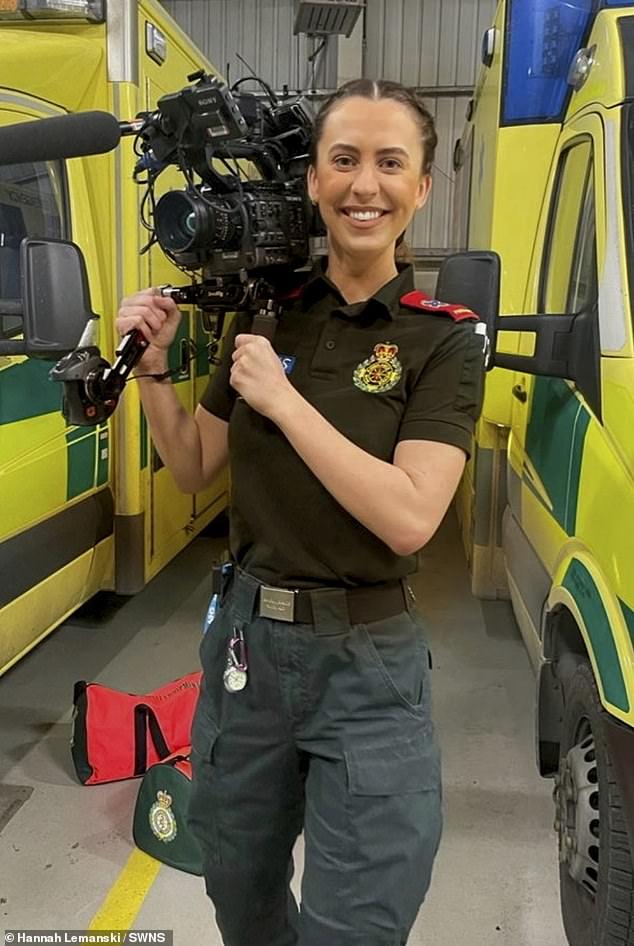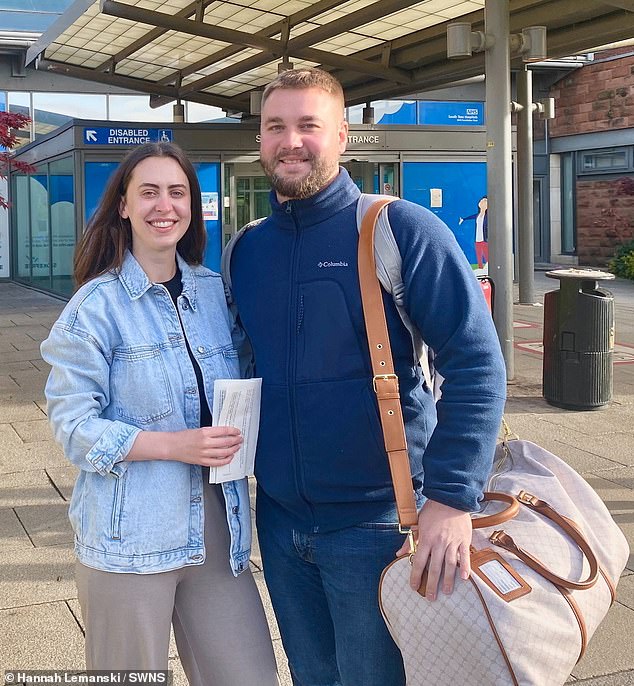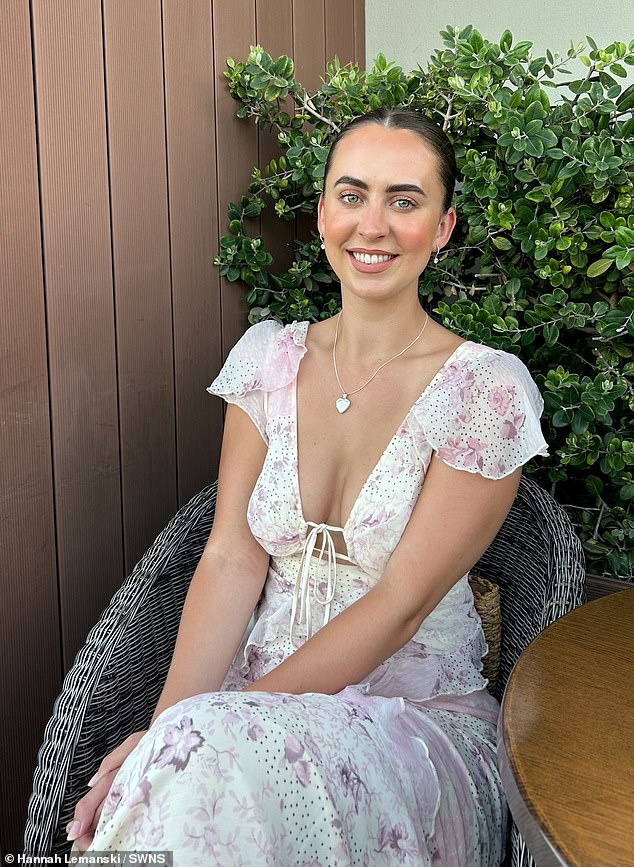A paramedic had her brain tumour missed five times by doctors after her double vision was mistaken for a lazy eye.
Hannah Lemanski, 24, thought she was experiencing stress symptoms from shift work when she complained to doctors about vomiting, headaches, and double vision.
She visited the GP three times and self-presented at the eye assessment clinic but was always sent home with no answer.
On her fourth visit to the GP, Hannah was told she was getting a lazy eye.
But after a fifth visit to the eye assessment clinic, an MRI diagnosed Hannah with central neurocytoma – a rare brain tumour which grows in the ventricles of the brain.
She had 80 percent of the growth removed in surgery but two years on her tumour is returning.
Hannah said doctors recommended gamma-knife radiosurgery to shrink the mass but this is not funded by NHS England for her specific tumour type.
The treatment is recognised by the NHS and used to treat various health conditions, including brain tumours, both benign and cancerous.
She is now fundraising to get the treatment privately.

Hannah Lemanski, 24, thought she was experiencing stress symptoms from shift work when she complained to doctors about vomiting, headaches, and double vision

She visited the GP three times and self-presented at the eye assessment clinic but was always sent home with no answer. On her fourth visit to the GP, Hannah was told she was getting a lazy eye
Hannah, a paramedic, from Middlesborough, said: ‘I was always really tired, and I thought that was normal. Obviously, you just get used to it. I just thought it was from working night shifts.
‘Looking back now, I had been getting these headaches for years. The GP said I was getting esophoria, which is a lazy eye, and that’s what had been causing my symptoms.’
Hannah first visited her GP in February 2023 after experiencing headaches and vision problems for two months.
She was sent home with no answer and told her symptoms would be presented passed on to another doctor.
On her fourth visit to the GP she was told she had a lazy eye.
Hannah said: ‘Initially I was quite happy that it was nothing serious but after a couple of hours I realised there was something more serious going on.
‘It was really hard. After going back so many times and getting nowhere, I was starting to think it was all in my head.
‘I just knew something still wasn’t right. That’s why I kept on pushing.’
After a final visit to the eye assessment clinic in March 2023, Hannah was referred for a CT scan and recalled for an MRI.
That same day, she was diagnosed with a brain tumour.
Hannah, who planned to get married later that year, said she thought she was going to die when she heard the news.
The wedding to her now-husband, Przemek Lemanski, 34, who was delivering invitations at the time of the diagnosis, had to be delayed.
Hannah underwent surgery to remove 80 per cent of the tumour James Cook hospital in May 2023 and returned to the front line as a paramedic.
But during a routine scan in March 2025, Hannah was told her tumour is returning.

She had 80 percent of the growth removed in surgery but two years on her tumour is returning

Hannah said doctors recommended gamma-knife radiosurgery to shrink the mass but this is not funded by NHS England for her specific tumour type
The NHS offers conventional radiotherapy, a destructive treatment which can lead to more cancer developing, but doctors told Hannah the most effective treatment is gamma-knife surgery – a non-invasive and highly targeted form of radiotherapy.
But Hannah was told by The National Centre for Stereotactic Radiosurgery in Sheffield’s Royal Hallamshire hospital that they don’t offer this treatment for her condition – and said NHS England does not commission funds for this treatment and her specific tumour type.
She applied for individual funding, but this was rejected.
Hannah said: ‘It’s quite upsetting. You pay your taxes every month and you expect to be looked after when you need it. How can you not look after one of your own?
‘Maybe if I wasn’t someone who worked for the NHS, I might have just accepted the conventional radiotherapy route, which I think for anyone of a young age without cancer puts them at so much higher risk, especially when there’s more effective treatments out there.
‘I think it’s quite discriminatory really, because I don’t understand why someone’s brain tumour is better than mine.’
Hannah’s friend, Becky Calpin, 32, has raised over £12,000 to help Hannah get private treatment, but it could cost up to £20,000.
Becky said: ‘Hannah is more than a paramedic – she’s a bright, healthy, active young woman, married to her best friend and dreaming of starting a family.
‘She’s the kind of person who lights up every room – always smiling, always giving, always ready to help.’

The treatment is recognised by the NHS and used to treat various health conditions, including brain tumours, both benign and cancerous. She is now fundraising to get the treatment privately
Hannah is now campaigning to reform the individual funding request system by cutting unnecessary delays with a petition that has nearly 3,000 signatures.
She said: ‘The news of requiring further treatment is daunting, but to discover the NHS may not fund the required care is disheartening and frustrating.
‘The individual funding request system was created to manage access to exceptional treatments, but for patients like myself with a critical illness, it feels like a barrier rather than a lifeline. When clinicians advocate for treatment based upon medical need, the system should support that judgment, not stand in the way.
‘A person living with a critical illness has already faced many challenges – physically, mentally, and emotionally.
‘No one living with a critical illness should have to fight for their care. When effective, recommended, affordable, and available treatment exists, why is the NHS gambling with unnecessary delays?’
The petition could help other people whose conditions are a loophole in the funding list, Hannah says, but also could protect her in the future should the tumour regrow.
You can sign Hannah’s petition here.
Or support her treatment here.
A spokesperson for NHS England said: ‘We understand the importance of making decisions quickly to avoid unnecessary distress and, where treatment isn’t routinely funded, clinicians can submit an individual funding request if there are exceptional clinical reasons.
‘The NHS funds specialist stereotactic radiosurgery and radiotherapy for some cancers where there is evidence of a clinical benefit over standard treatments, as part of the personalised care provided for patients.’











